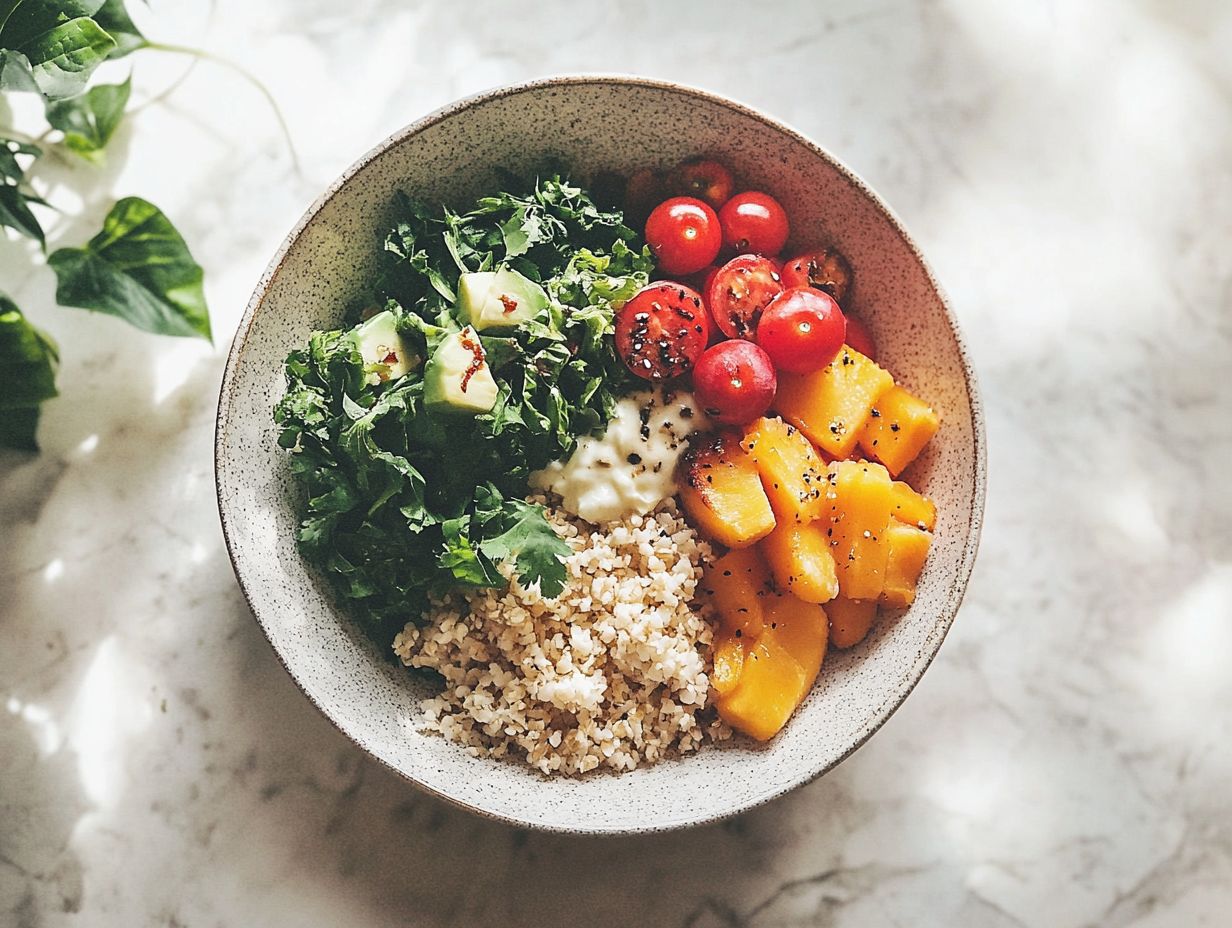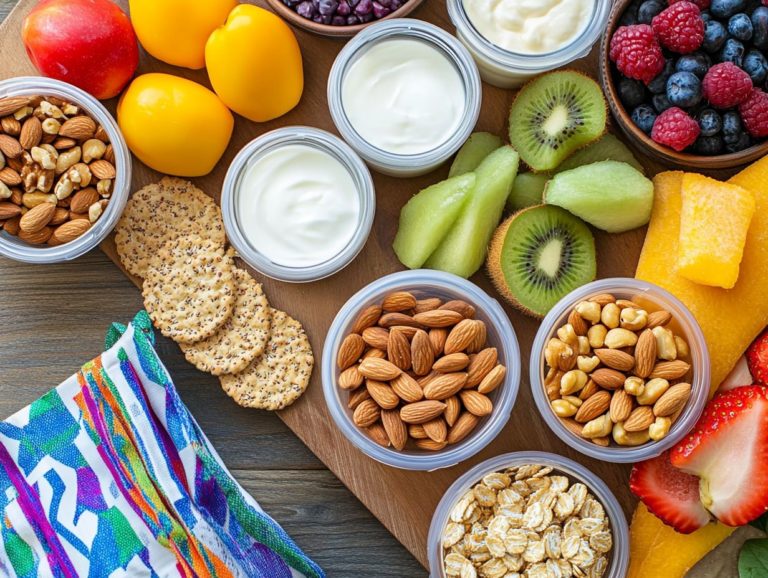How to Develop a Balanced Eating Routine
In today s fast-paced world, maintaining a balanced eating routine can seem daunting. However, the benefits for your overall health are undeniable.
This article explores the art of crafting a balanced plate by breaking down the nutrients that provide energy and essential vitamins and minerals, complete with practical meal planning tips tailored just for you.
You ll discover the significance of variety and moderation, allowing you to keep your meals vibrant and enjoyable without falling into the trap of overindulgence.
We will provide effective strategies to uphold your routine and navigate common obstacles, ensuring you achieve lasting success on your health journey.
Contents
- Key Takeaways:
- The Importance of a Balanced Eating Routine
- Creating a Balanced Plate
- Meal Planning for a Balanced Eating Routine
- Incorporating Variety and Moderation
- Maintaining a Balanced Eating Routine
- Addressing Challenges and Roadblocks
- Frequently Asked Questions
- What is a balanced eating routine?
- Why is it important to develop a balanced eating routine?
- How can I start developing a balanced eating routine?
- What are some tips for maintaining a balanced eating routine?
- What are some common mistakes people make when trying to develop a balanced eating routine?
- How can I make sure I am getting all the necessary nutrients in my balanced eating routine?
Key Takeaways:

A balanced eating routine is crucial for overall health, providing numerous benefits and preventing health issues. Creating a balanced plate involves understanding and incorporating the right balance of nutrients that provide energy and essential vitamins and minerals. Meal planning, including tips for meal prep, is key in developing and maintaining a balanced eating routine.
The Importance of a Balanced Eating Routine
A balanced eating routine is essential for achieving optimal health and preventing chronic conditions like type 2 diabetes and heart disease.
This means embracing a diverse array of food staples fruits, vegetables, whole grains, and healthy fats while paying attention to portion sizes.
Experts stress the importance of meal planning and effective cooking techniques. By following these practices, you can cultivate a balanced diet that aligns with guidelines from the U.S. Government and resources like MyPlate and Canada s Food Guide.
Benefits for Overall Health
Healthy eating offers a wealth of benefits, significantly reducing the risk of chronic conditions while fostering a well-balanced diet.
When you prioritize a diet rich in fruits, vegetables, whole grains, and healthy fats, you enhance your physical well-being and set the stage for effective weight management, boosting your energy levels.
The fiber found in fruits and vegetables is crucial for improving digestion, regulating bowel movements, and promoting gut health.
On a mental level, incorporating these nourishing foods can elevate your mood and sharpen your cognitive function, illustrating how a nutrient-dense diet contributes to both physical health and overall mental wellness.
Creating a Balanced Plate
Creating a balanced plate is exciting! Combine different food groups for optimal nutrition that keeps you energized.
This harmonious blend enhances your meals and elevates your overall well-being.
Understanding Nutrients
Understanding nutrients that provide energy and essential vitamins and minerals is crucial for achieving your nutrition goals.
Nutrients that provide energy carbohydrates, proteins, and fats are your body’s primary energy sources. Carbohydrates are your main energy source, proteins are vital for building and repairing tissues, and fats aid in nutrient absorption and hormone production.
Essential vitamins and minerals support immune function, bone health, and overall metabolic processes.
By incorporating a diverse range of both energy-providing nutrients and essential vitamins and minerals into your daily meals, you can foster optimal health and significantly enhance your well-being.
Meal Planning for a Balanced Eating Routine

Meal planning is a powerful strategy that gives you the power to make informed food choices and stay aligned with your nutrition goals.
It allows you to explore various cooking techniques and refine your meal prep skills while enjoying the process of crafting nourishing dishes.
Tips and Tricks for Meal Prep
Effective meal prep requires you to harness essential cooking techniques and staple foods. This ensures that your portion sizes align perfectly with a balanced diet.
By embracing methods like cooking large quantities of food at once, you save time now while preparing nutritious meals for the week ahead.
Investing in high-quality containers for portion control helps maintain proper serving sizes and keeps your food fresh and delicious.
Exploring different cooking techniques such as steaming, grilling, and slow cooking adds exciting diversity to your menu and elevates the flavors of your dishes.
Don t overlook the benefits of incorporating seasonal ingredients. This approach makes your meals more delightful and keeps them economical, reinforcing smart eating throughout the week.
Incorporating Variety and Moderation
Incorporating variety and moderation into your diet is essential for maintaining healthy eating habits and achieving a balanced diet over time.
Embracing a diverse range of foods enhances the pleasure of your meals and ensures your body receives the necessary nutrients it craves.
Balancing these choices empowers you to cultivate a sustainable and enjoyable approach to nutrition.
Avoiding Food Boredom and Overindulgence
To keep food boredom at bay and prevent overindulgence, explore a range of food choices while practicing moderation.
Diving into various flavors invigorates your daily meals, turning dining into a delightful experience rather than a monotonous chore.
Experiment with new recipes that highlight seasonal ingredients. This offers freshness and a dash of excitement with every bite.
Utilizing different cooking techniques can reinvent familiar foods, transforming your meals into something entirely new. Remember, moderation is key to maintaining a balanced diet.
By being conscious of portion sizes and the frequency of indulgent dishes, you can savor diverse meals without compromising your health.
Maintaining a Balanced Eating Routine
Maintaining a balanced eating routine demands consistent effort and commitment. Track your nutrition goals diligently by utilizing tools such as a meal tracker or food diary to ensure you stay on course.
This approach enhances your awareness of what you consume and helps you achieve the dietary balance you aspire to.
Strategies for Long-Term Success

Strategies for long-term success in maintaining a balanced diet revolve around establishing meal planning routines, setting realistic nutrition goals, and practicing healthy eating habits consistently.
Develop a weekly meal schedule that includes a variety of nutrient-rich foods. This streamlines your grocery shopping and minimizes the temptation of unhealthy options.
Creating a supportive environment is equally important. Invite friends or family to participate in healthy cooking or join group challenges to gain motivation and accountability.
Together, these actionable strategies lay the groundwork for achieving lasting health and well-being.
Addressing Challenges and Roadblocks
Addressing challenges and roadblocks in meal planning and healthy eating is crucial for achieving a balanced diet and long-term wellness.
By navigating these obstacles effectively, you set yourself on a path toward a healthier lifestyle that nourishes both body and mind.
Overcoming Obstacles and Staying on Track
Overcoming obstacles to healthy eating is essential for staying on track with your meal planning and achieving a balanced diet.
To effectively navigate challenges like tight schedules or tempting snacks, leverage a few practical strategies. One powerful tool is a meal tracker. This tool helps you log your food intake in an organized manner and keeps you accountable.
Using a meal tracker encourages mindfulness about your food choices and allows you to identify patterns in your cravings. This makes it easier to choose smart substitutions.
Plan your meals in advance, prep healthy snacks, and set specific times for eating. These strategies can significantly reduce the impact of time constraints. By integrating them into your routine, you ll find it much easier to cultivate habits that support your nutritional goals and maintain a sustainable lifestyle.
Frequently Asked Questions
What is a balanced eating routine?
A balanced eating routine is a healthy and sustainable way of eating. It includes a variety of foods from different food groups in appropriate portions, providing your body with necessary nutrients.
Why is it important to develop a balanced eating routine?
Developing a balanced eating routine keeps your weight healthy and manageable! It reduces the risk of chronic diseases and improves your overall physical and mental well-being.
How can I start developing a balanced eating routine?
Start now to create a meal plan that includes a variety of fruits, vegetables, whole grains, lean proteins, and healthy fats. Make sure to eat regular meals and snacks to avoid overeating and keep your energy levels stable.
What are some tips for maintaining a balanced eating routine?
Some tips for maintaining a balanced eating routine include listening to your body’s hunger and fullness cues, choosing whole and minimally processed foods, and incorporating a variety of flavors and textures into your meals.
What are some common mistakes people make when trying to develop a balanced eating routine?
Common mistakes include skipping meals, relying on fad diets, not incorporating enough fruits and vegetables, and depriving themselves of favorite foods. It’s important to find balance and variety in your eating habits.
How can I make sure I am getting all the necessary nutrients in my balanced eating routine?
To ensure you’re getting all necessary nutrients, include a variety of foods from all food groups in your meals. You can also consult with a registered dietitian for personalized recommendations based on your specific dietary needs and preferences.







